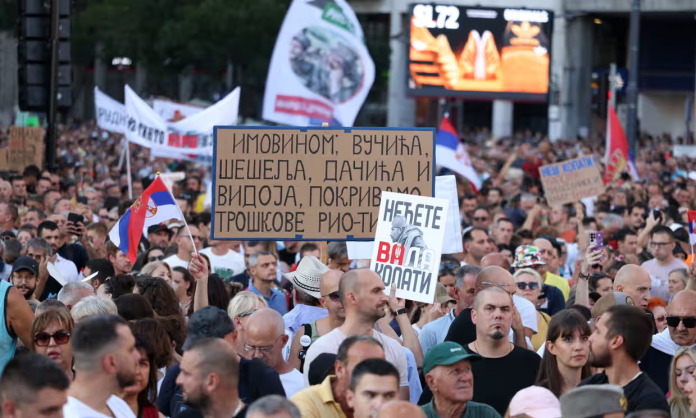A mass protest against lithium mining ended with the arrests and sentences of three environmental activists, Ivan Bjelić, Nikola Ristić, and Jevđenije Julijan Dimitrijević.
Bjelić was sentenced to a 40-day detention, while Ristić and Dimitrijević received a 30-day arrest for “disturbing public order and peace,” according to the first instance judgement, which legal experts called “draconian.”
The activists were arrested in the early hours of 11 August at one of the two Belgrade railway stations blocked by protesters. Thy were convicted, however, not for blocking the railway, but for disrupting public order by verbally abusing a journalist from pro-government Informer television who was reporting on the scene, according to local media.
The Higher Public Prosecutors Office in Belgrade announced on 11 August that all those who blocked the railway would be prosecuted. Lawyer Rodoljub Šabić, former Public Information Commissioner of Serbia, called the sanctions “draconian” and an intimidation attempt. The lawyer of the arrested activists Marko Pantić stated:
It is alleged that they obstructed the journalist’s work, surrounded her and shouted. In our opinion, this action must be concretised. What did they shout, where did they surround her, how did they disturb her? If they shouted ‘child poisoning’, it was not directed at that journalist personally. I believe that no one thinks that the journalist poisons children, but that it refers to the Jadar project and the whole story for which the protests were organised.
Railway blockade
The blockade of railway stations lasted several hours and ended after police intervened. Interior Minister Ivica Dačić said on Sunday that the police acted without using coercive measures and that no one was hurt. President Aleksandar Vučić declared:
The blockades and protests are not the solution. I will talk to the people about the fear of lithium mining and with those who think differently.
Zlatko Kokanović, an environmental activist and one of the organisers of protests against lithium mining, said that environmental organisations would not give up their demands for a ban on lithium mining in Serbia.
We want to send a message, you can arrest us, but we continue, we are not afraid, we are heading towards victory, to the end.
Prior to the railway blockade, some 30,000 people took to the streets of Belgrade on Saturday night to protest against the re-announcement of the opening of the lithium mine of the international company Rio Tinto in the Jadar River valley in the west of the country.
The protest was organised by the Association of Environmental Organisations of Serbia. Speakers claimed that they would not allow the mine to open due to concerns that the lithium mine would pollute water sources and seriously jeopardise public health.
Lithium for EU electric vehicles
A series of protests began following the Serbian government’s decision in mid-July to continue a project to open a lithium mine in the Jadar Valley, which was halted by state authorities in 2022 also due to large-scale protests.
On 19 July, the Critical Raw Material Summit was held in Belgrade. The meeting was attended by German Chancellor Olaf Scholz, European Commission Vice-President Maroš Šefčovič, and President Vučić. It concluded with the signing of a Memorandum of Understanding between the EU and Serbia on sustainable raw materials, battery value chains, and electric vehicles (EVs).
The EU has been expressing interest in Serbian lithium reserves in the context of reducing dependence on the critical raw material and transitioning to a green economy. Germany also showed appetite in recent years, with lithium batteries being a key element in the production of EVs.
According to the Rio Tinto plan, the Jadar project will produce around 58,000 tonnes of lithium per year, enough for 17% of Europe’s EV production. According to recent statements by the Serbian authorities, led by the Serbian Progressive Party, the mine will open in 2028 if the company complies with environmental regulations and obtains the necessary permits.
In recent years, many experts and environmental associations in Serbia have argued that lithium mining could have serious negative consequences for the environment. Widespread mistrust in Serbia’s state institutions, which would be responsible for enforcing environmental standards, has also been emphasised.
